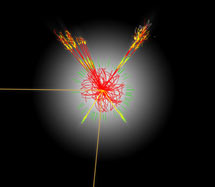

Monday - March 29, 2010
SLAC Today is
available online at:
http://today.slac.stanford.edu
In this issue:
Capturing More Gamma Rays
First LHC Collisions Webcast
Reminder: Director's Workgroup Meetings Begin Today
Colloquium Today: Nanophotonics—Light, Heat and Solar Cells
 |
 |
|
Monday - March 29, 2010 |
Capturing More Gamma RaysFrom left: Justin Vandenbrouke, Stefan Funk, Rolf Buehler, Leonid Sapozhnikov, Hiro Tajima
and Keith Bechtol hold electronic chips they are developing for improved gamma ray detecting telescopes. (Photo by Julie Karceski.)
Stefan Funk wants to improve ground-based gamma ray imaging systems. Today's best instruments have their limits, Funk noted, and newer, more sensitive equipment is required to enter the next stage of astrophysical research. A physicist with the joint SLAC/Stanford Kavli Institute for Particle Astrophysics and Cosmology, Funk received funding for a Laboratory Directed Research and Development project to develop components capable of boosting gamma ray telescope speed and precision while keeping costs down. Each year, the lab director sets aside a maximum of eight percent of the lab budget for LDRD projects to encourage innovative research and development. "LDRD money is a great tool to do this kind of work," Funk said. LDRD funding goes exclusively to new projects, rather than established research programs, allowing scientists to explore special projects and innovative ideas. Funk and his collaborators from the Advanced Gamma-ray Imaging System have a handful of objectives for the next generation of gamma ray telescopes. Among others, they want to explore the origins of cosmic rays and to uncover signals of dark matter in gamma rays. Read more... 
This simulated collision shows the production of a Higgs particle in the ATLAS detector. (Image courtesy CERN/J. Pequenao.) First 7 TeV LHC Collisions WebcastVery early tomorrow morning, physicists and engineers will for the first time attempt to collide protons at 7 TeV at CERN's Large Hadron Collider. CERN will stream a live webcast of the events beginning at 11:30 p.m. PDT this evening and ending at 9:15 a.m. tomorrow morning, with the first collision attempt taking place between midnight and 2:00 a.m. SLAC's ATLAS team invites everyone at the laboratory to view a replay of the collision attempt in Kavli Auditorium between 6:50 and 8:50 a.m. tomorrow morning, followed by recorded highlights of the day from 9:00 to 9:15 a.m. A live feed from the ATLAS control room will also be on display. All are invited to attend. Reminder:
|
Events
Access (see all)
Announcements
|
|
| | ||
|
|
||
 <%
Response.AddHeader "Last-modified", getArticleDate()
'Response.AddHeader "Last-modified","Mon, 01 Sep 1997 01:03:33 GMT"
'Monday, December 06, 2010
%>
<%
Response.AddHeader "Last-modified", getArticleDate()
'Response.AddHeader "Last-modified","Mon, 01 Sep 1997 01:03:33 GMT"
'Monday, December 06, 2010
%>View online at http://today.slac.stanford.edu/. |
||